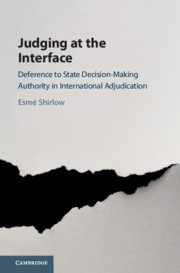Book contents
- Judging at the Interface
- Judging at the Interface
- Copyright page
- Dedication
- Contents
- Figures
- Tables
- Foreword by Judge James Crawford
- Acknowledgements
- Table of Cases
- Table of Treaties, Resolutions, and Declarations
- Abbreviations
- Introduction Deference and the International Adjudication of Private Property Disputes
- Part I Conceptual Framework and Methodological Approach
- 1 Defining Deference: The Connection between Deference and Authority
- 2 Deference in Context: Domestic Authority and International Private Property Claims
- 3 Locating Deference: The Function of Deference in Legal Adjudication
- Part II Deference in the International Adjudication of Private Property Disputes
- Part III The Systemic Role of Deference in International Law
- Appendix Data Tables
- References
- Index
2 - Deference in Context: Domestic Authority and International Private Property Claims
from Part I - Conceptual Framework and Methodological Approach
Published online by Cambridge University Press: 24 February 2021
- Judging at the Interface
- Judging at the Interface
- Copyright page
- Dedication
- Contents
- Figures
- Tables
- Foreword by Judge James Crawford
- Acknowledgements
- Table of Cases
- Table of Treaties, Resolutions, and Declarations
- Abbreviations
- Introduction Deference and the International Adjudication of Private Property Disputes
- Part I Conceptual Framework and Methodological Approach
- 1 Defining Deference: The Connection between Deference and Authority
- 2 Deference in Context: Domestic Authority and International Private Property Claims
- 3 Locating Deference: The Function of Deference in Legal Adjudication
- Part II Deference in the International Adjudication of Private Property Disputes
- Part III The Systemic Role of Deference in International Law
- Appendix Data Tables
- References
- Index
Summary
Chapter 2 introduces the focus and approach of the study. Existing studies of deference have focussed upon specific approaches to deference adopted by particular international courts or tribunals. This book instead studies deference comparatively, to explore its systemic implications in international adjudication. The study is based upon a relatively homogenous group of cases from four international courts and tribunals. The empirical study of deference in this setting is designed to capture approaches to deference present in a subset of international cases. Property disputes were selected as the focus of this study because property has been a subject of long-term protection under international law, and property disputes are litigated in a range of international regimes. This opens up the possibility for temporal and cross institutional study. This Chapter introduces the setting for the study. It introduces private property obligations under international law, and the adjudicative regimes selected for detailed study, identifying the elements of unity and plurality that make these courts and tribunals a particularly fruitful focus for the comparative study.
Keywords
- Type
- Chapter
- Information
- Judging at the InterfaceDeference to State Decision-Making Authority in International Adjudication, pp. 43 - 68Publisher: Cambridge University PressPrint publication year: 2021

